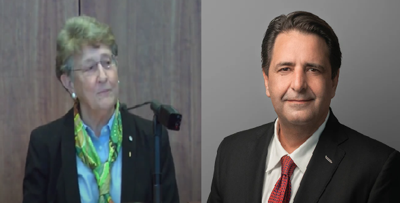
Jean Toal, left, and Peter Protopapas
COLUMBIA, S.C. - The judge in charge of South Carolina’s one-of-a-kind asbestos docket is struggling to preserve a system she created as the state’s highest court has placed tight restrictions on her ability to empower a local personal injury lawyer to collect money for plaintiffs and their attorneys.
The process was working almost seamlessly until Judge Jean H. Toal – herself a former chief justice of the South Carolina Supreme Court – started going after solvent companies instead of long-defunct firms with no owners.
These new targets have been fighting back, and recently won Supreme Court rulings that sharply curtailed Judge Toal’s power to appoint Columbia attorney Peter Protopapas as receiver of companies in order to sue their former insurers over decades-old policies.
The judge struggled with the implications of those rulings at a Tuesday hearing during which a lawyer for Altrad Group, a multibillion-dollar U.K. industrial-services firm, urged her to drop her attempts to drag Altrad and others including the DeBeers mining conglomerate into her court.
Judge Toal appointed Protopapas receiver over Altrad’s Cape Intermediate Holdings unit, the successor to a South African firm that once mined asbestos, and he has used his position to sue Altrad, DeBeers and Anglo-American with claims they engaged in an elaborate conspiracy to hide assets from U.S. asbestos plaintiffs.
But the U.K. court with jurisdiction over Cape has slapped a global injunction on Protopapas and fined him $1 million for interfering in Cape’s operations.
The South Carolina Supreme Court, while decrying the U.K. court’s action as “shocking to American eyes,” reminded Judge Toal in a June order that she can only appoint receivers to collect assets for a single plaintiff and appointing one in the absence of a court judgment should be reserved for the “rarest” and “most extraordinary cases.”
Altrad argues Judge Toal has allowed Protopapas to leverage his appointment in one lawsuit against Cape to pursue actions in the name of an entirely different plaintiff.
“The Supreme Court has given this court an easy way to unwind this whole rotten situation,” said Altrad’s lawyer, Todd Carroll, at the hearing. Protopapas’ “whole argument is based on a foundation of sand that has been washed out to sea.”
Judge Toal seemed confused at times about the implications of the South Carolina Supreme Court’s recent orders. She has appointed Protopapas as receiver for more than 20 firms so far, under agreements that let him keep 30% of any money he collects.
Protopapas has taken in more than $50 million so far, earning millions of dollars in fees for himself and placing the rest of the money in secretive Delaware trusts he says are used to pay plaintiff-lawyer fees and settlements to other asbestos plaintiffs.
The Supreme Court’s order that a receiver can only be appointed to pursue assets to satisfy one case “is odds with the very first receivership I established about which no one has fussed or complained one bit,” she said. “It was the ground under which this whole asbestos docket changed.”
Judge Toal’s previous targets had been defunct firms whose only “assets” were historical records of insurance policies her hand-picked receiver, Protopapas, could use to leverage settlements from insurance policies. Insurers had little incentive to challenge the system because Protopapas offered them closure by “buying back” policies to theoretically foreclose anyone else from making claims against them.
Insurance claims belong to the person making them so it is unclear how an insurance company can protect itself against future claims with this mechanism.
The receivership system is in danger of unraveling now, however. Judge Toal finds herself in a difficult position because she appointed Protopapas receiver of Cape at the request of a plaintiff named Keith Park.
Park was the personal representative of his mother, who died before her asbestos case got to trial, but Altrad’s lawyers have filed documents showing Park settled her estate completely six months before he supposedly asked Judge Toal to appoint a receiver.
Attorney Theile McVey struggled to explain how her client Park could have asked for a receiver when he was no longer personal representative and his mother’s estate had been settled.
“I had no idea it happened,” McVey said. “No one had told me.”
Judge Toal has since allowed Protopapas to pursue litigation against third parties in the name of another plaintiff named Tibbs. Protopapas has asked Judge Toal to appoint him receiver over Cape in the Tibbs case, but she faces a dilemma: Since the Supreme Court has said the receiver can only be appointed in one case, it could make all of Protopapas’s previous actions void.
And South Carolina law only allows receivers to be appointed over insolvent companies and Cape is very much alive, so defense lawyers will have another chance to argue any receivership is illegal.
At one point Judge Toal acknowledged what the whole receivership scheme is designed to do: Avoid federal bankruptcy court. She described the “beneficial use of receiverships,” which are “a different animal” than bankruptcy.
“If you used the blunt instrument of a bankruptcy, you interfere with the tort litigation tremendously,” she said.
A provision in the Bankruptcy Code allows the orderly reorganization of companies to pay asbestos claims. That process allows judges to place a stay on all litigation, potentially trimming the fees plaintiff lawyers can earn but ensuring claims are paid according to their legal priority.
The lawyers for Altrad, DeBeers and others seemed to be threatening the entire receivership system Judge Toal had devised.
“The solution that they ask for from this court and the Supreme Court is to abolish all the receivers, including the ones in which they have cooperated to set up qualified settlement funds,” the judge said. “Doesn't make any sense to me.”
Judge Toal has strong support from South Carolina plaintiff lawyers, who filed letters with her court supporting the use of receivers to take over companies and collect money for multiple plaintiffs. Lawyers representing PFAS plaintiffs sent the judge a letter urging the continued use of receiverships to collect money for their clients, as did Motley Rice, the state’s most prominent plaintiff firm.
Defense lawyers complained about what they called ex parte communications, but Judge Toal was having nothing of it. One letter was dated July 10, but the judge said she only read it after it was included in court filings last week.
“Let me just say I don't consider any of these letters …to be anything other than informational material for me in connection with this matter,” the judge said. “I don't think they’re ex parte communications because they are communications sent to me and to you all at the same time.”








